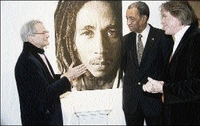
Photographer David Burnett (left) showing Jamaica's ambassador to the United States. Anthony Johnson (second right) one of his 40 photographs of reggae star Bob Marley, now on display at the Govinda Gallery, in Washington, DC. Looking on is Gallery Director, Christopher Murray. - JIS photo
AS AN in-demand news photographer, David Burnett covered wars in Vietnam and Iran. But he says the bloody scenes he saw in those conflicts have little comparison to the photos he took of reggae superstar Bob Marley in 1976.
Burnett's photos of the reggae king are the subject of a book, Soul Rebel: An Intimate Portrait of Bob Marley, which was recently released by Insight Editions. An exhibition of the same name is currently on at the Govinda Gallery in Washington DC.
The 150-page book is not limited to Burnett's Time assignment. Shots he took the following year on the European leg of Marley's Exodus tour are also included.
Burnett cut his teeth as a war correspondent by shooting the Vietnam War and Iranian revolution for Time and Life magazines. Four years ago, an incident at his daughter's college influenced him to go public with his photos of one of the 20th century's most noted peace advocates.
"She dragged me to her friend's room and on the wall was the same photo of Bob that's now on the cover of the book," Burnett told Tidbits Tuesday. "For me, it was a wake-up call, it made me understand how trans-generational Bob's appeal is."
Burnett took his photos to Chris Murray, a director at the Govinda, who not only urged him to stage an exhibition there but to produce a book.
Of Jewish heritage, Burnett was born in Salt Lake City, Utah, and knew little about Jamaica and reggae when he and Time writer Dave Devoss travelled to the country in March 1976 to interview Marley. Although he had seen the movie The Harder They Come and listened to some of Jimmy Cliff's music, he was more into progressive rock bands like the Moody Blues and the Alan Parsons Project.
Riding high
Marley was riding high at the time with his Rastaman Vibration album. The previous year, rock superstar Eric Clapton's cover of his song I Shot The Sheriff went to number one on Billboard magazine's pop chart.
Although his career had taken off, Burnett says Marley never flaunted his fame.
"Nowadays, if you are going to see anybody of note in the music or entertainment business, there's this posse of publicity people but that wasn't the case," Burnett recalled. "We went to Tuff Gong and had a long, open discussion with him about everything, from music to the political situation in Jamaica."
By 1977, Marley was regarded as a Third World hero and his Exodus album hailed as a masterpiece. Burnett covered the Paris, Brussels and The Hague shows on the Exodus tour; the passion of that jaunt contrasts the laid-back Marley he photographed in Kingston the previous year.
Burnett returned to Jamaica in the early 1980s for an extensive assignment for National Geographic. He plans to hold an exhibition of Soul Rebel in Kingston this year.